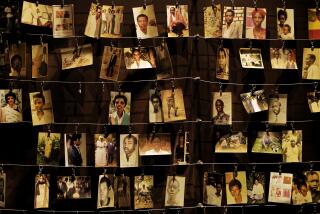Mission Impossible : Is The Price in Somalia Too High?
- Share via
WASHINGTON — Thursday, President Bill Clinton, elected to the White House to reform domestic policy, put his presidency on the line because of foreign policy. In response to the disastrous Oct. 3 setback in the U.N. effort to capture Somali warlord Mohammed Farah Aidid-- 15 U.S. dead and 78 wounded--Clinton faced enormous pressures to withdraw U.S. forces immediately from the U.N. peacekeeping effort. The congressional reception given to Secretary of State Warren Christopher and Defense Secretary Les Aspin had been sulfurous and his own advisers had no clear plan for extrication.
Clinton decided to increase U.S. commitments by sending, along with more armor, 5,300 additional troops--and delivered a promise that all U.S. forces would be out of Somalia in six months. This new commitment runs the risk of another comparable setback as the clock ticks down, but it saves Washington from the humiliation of having one underarmed warlord drive the United States from the field of battle. Nonetheless, if there is another setback comparable to that of last Sunday, the effectwill be like a wrecking ball on the Clinton presidency. Public support for U.S. involvement in peacekeeping--whether under U.N. or any other auspices--will disappear. The Administration may find it almost impossible to get congressional approval for U.S. participation in a peacekeeping force in Bosnia, which has become almost a test of the Administration’s determination to remain a major power in Europe.
But there will also be domestic consequences. The image of the competent commander-in-chief is central to the power of the presidency, domestically as well as internationally. If there is another misstep in Somalia, the future potential of the Clinton Administration will be gravely damaged. What went wrong?
To answer this, we have to return to some of the early policy approaches of this Administration. The Clinton Administration came into office as a strong proponent of muscular multilateralism. Many senior officials believed U.N. peacekeeping had not been aggressive enough in places like the former Yugoslavia. If necessary, the United Nations should use military force to compel compliance with its mandates.
These policy-makers also believed the United States could maintain its postwar leadership role and promote world order, while saving money, by working through multilateral organizations. Why not get the United Nations instead of the United States to do the world’s dirty work?
This approach, in many respects, has considerable merit. But the difficulty in Somalia is that the outside intervention was moving beyond a role of aggressive preventive diplomacy to a new role of establishing a peace protectorate.
The task, though difficult, might have been achievable without significant casualties had the United Nations continued the approach followed by the Bush Administration. At that time, Robert B. Oakley, in the position of pro-consul in Somalia during the initial U.S. intervention, attempted to work with all political factions in the country, including Aidid. But after Oakley left, the new policy objective seemed to be to push Aidid off the political stage. The warlord quite predictably refused to play the role he had been assigned and violence ensued. Now, the fact that Oakley was reappointed on Thursday to again serve as an envoy to the region suggests Clinton wants to resume this approach.
But can the United Nations impose a peace protectorate on Somalia? The answer is: Yes, but probably not at a cost that the world will want to pay. Even if the Western world decides to pay this cost in Somalia--where U.S. and U.N. soldiers have died--it will think long and hard before it attempts a similar mission elsewhere. For though the United Nations has often been able to play a useful security role through the consensual activities of mediation and observation, it has seldom attempted to take over whole countries against the will of a significant portion of the population. When it has, difficulties have arisen--as in the Congo in the 1960s or Somalia today.
There are several reasons why.
First, the task proposed is more difficult than it seems. Both East and West spent the last 40 years arming the Third World. Forceful intervention with the imperialist mission of imposing order against local opposition thus runs great risks for the intervening troops.
Second, there is a serious problem in gaining adequate intelligence when a large segment of the population is opposed to the intervention. Consider the British in Northern Ireland. They enjoy excellent intelligence, speak the same language, have sympathizers in both the Catholic and Protestant segments of the population and have long occupied the area. Yet, despite years of effort, the British have been unable to identify their enemy with sufficient precision to end the civil strife.
Contrast the position of the United States and the United Nations in Somalia. There, the terrain is strange, the language unintelligible, and the United Nations has few, if any, agents in place. This is why U.S. and other forces have repeatedly attacked the wrong premises in the search for Aidid.
But the problems the United States and the United Nations face in Somalia do not end there. In the past, imperial powers could impose their sway on vast sections of the globe because few at home paid much attention to the methods used by their imperial agents to impose law and order on sullen populations abroad. The international press was largely absent and, even when present, its purpose was to cheer the conquerers--not report the resistance.
The international human-rights movement had also not been born. Governments did not have to worry about facing criticism at home, or in international forums, that they had not followed due process or respected human rights once they captured their enemy.
Before Somalia, the United Nations attempted to establish a peace protectorate only once--in the Congo. How it accomplished its mission has troubling implications for the effort the Clinton Administration is supporting in Somalia. At a critical moment, the U.N. commander in the Congo simply cut off phone contact with New York and proceeded to crush the rebellion in Katanga. Once successful in re-establishing central control over all the country’s territory, the United Nations concentrated on establishing an effective government--not on establishing democracy. The real power in the country was Gen. Mobutu Sese Seko, who formally seized power in 1965, and went on to become one of this century’s great tyrants.
Notwithstanding this, the U.N. operation was judged a success. It would not be deemed a success today. The only goal then was to maintain the physical integrity of the former Belgian colony under a non-communist government. In Somalia, the United Nations has many goals--feeding the people, capturing Aidid, promoting democracy, holding the country together and promoting respect for human rights. The task is imperial in its conception and, properly undertaken, will last years. No international effort is sustainable under these conditions--unless all the major factions in Somalia support it.
The United Nations now has two sensible options: One is to work hard to capture Aidid but, once successful, immediately to declare victory and to return to the more consensual approach. This means more casualties. It also means working to include Aidid’s clan in the negotiations after he has been punished.
The other is to replace the leadership in the U.N. mission and use the change as an excuse to re-emphasize the conciliation process under way when Washington turned the operation over to the United Nations.
What is not sensible is to continue to try to impose a protectorate on an angry population that can be beaten down but not at a price that the United Nations or any democratic country is likely to pay.
* See related story on Page 2.
More to Read
Sign up for Essential California
The most important California stories and recommendations in your inbox every morning.
You may occasionally receive promotional content from the Los Angeles Times.










